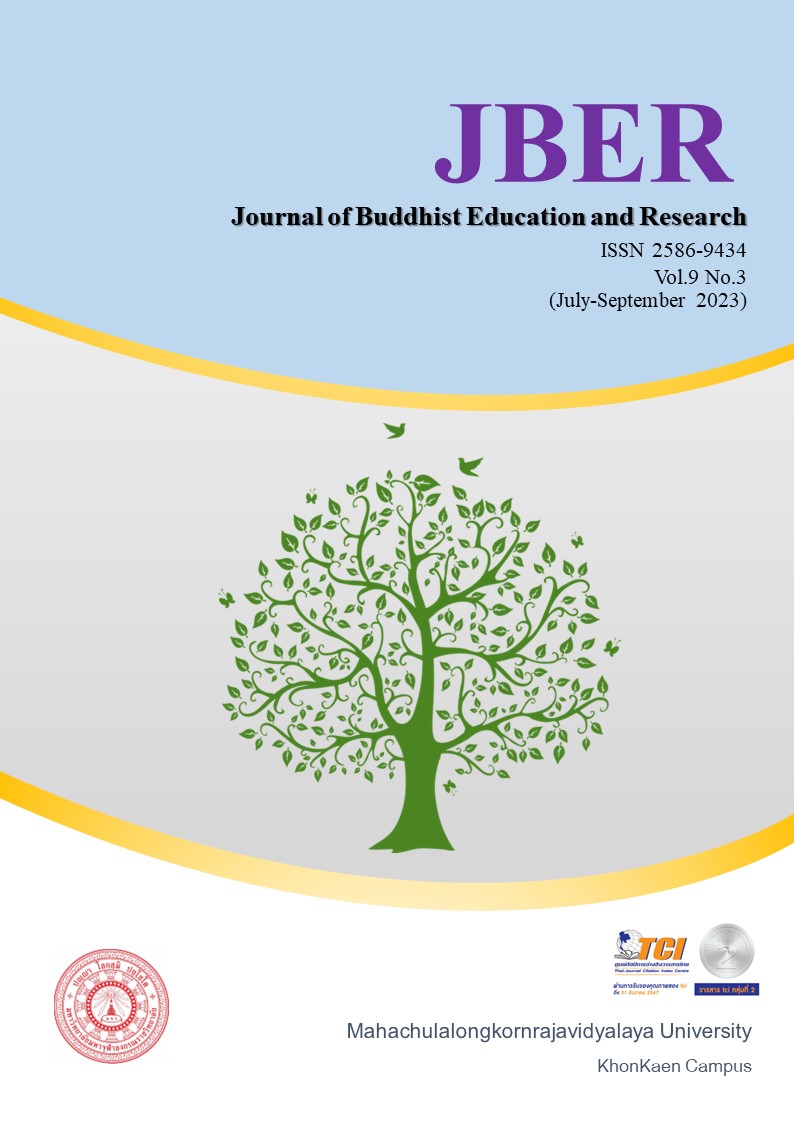THE DEVELOPMENT OF PROFESSIONAL TEACHERS INDICATORS OF TEACHERS IN THE DIGITAL AGE
Keywords:
Professional Teachers, Indicators, In The Digital AgeAbstract
This research aims to develop indicators of professional teachers in the digital age. Quantitative research techniques The sample group was teachers under the Office of Non-Formal and Informal Education Promotion. A total of 322 people were found in the three southern provinces, out of 37 schools using a simple random sampling method. questionnaire tool The CVI index was.957 when validated by seven experts, and the data were analyzed using exploratory factor analysis techniques. Principal factor analysis was used to extract factors, and the varimax method was used to compose orthogonal spindles. The results of the study found that when used in the exploratory factor analysis, there were a total of 7 factors and 43 indicators, of which the factors were weighted between 1.038 and 18.196, the percentage of variance was between 2.256 and 39.557, and the cumulative percentage of variance was between 39.557 and 65.332, as follows: Indicators of educational and digital intelligence were weighted from 534 to 764 and averaged over, and 8 indicators of teacher ethics were weighted from 619 to 828. Self development 6 indicators, the indicator weights ranged from.534 to.649. In the aspect of promoting informal learning communities, the 4 indicators were weighted from.503 to.687. Promoting professional skills 3 indicators weighted from.580 to.708, 3 indicators promoting lifelong learning with indicator weights ranging from.527 to.659, and Social Intelligence 3. The indicator has an indicator weight value of 539 to 744.
References
กระทรวงศึกษาธิการ. (30 มกราคม 2564). นโยบายการจัดการศึกษาของกระทรวงศึกษาธิการ ปีงบประมาณ 2564-2565. สืบค้นเมื่อ 12 พฤศจิกายน 2564 จาก https://moe360.blog/2021/06/30/
พีรวิชญ์ คำเจริญ. (2561). การรู้เท่าทันดิจิทัล: วิวัฒนาการความหมายและทักษะ. Journal of Applied Informatics and Technology, 1(2), 72-81.
มนตรี อินตา. (2562). SOFT SKILLS: ทักษะที่จำเป็นสู่ความเป็นมืออาชีพของครูยุคใหม่. วารสารวิชาการศึกษาศาสตร์, 20(1).
มาโนช หัทยามาตย์ (2564). การเรียนการสอนสู่ความเป็นเลิศในยุคดิจิทัล. Wishing Journal Review, 1(2), 53-64.
วัชรพงศ์ พันธุ์อุปนนท์ (2564). รูปแบบการส่งเสริมการเรียนรู้ตลอดชีวิตในยุคดิจิทัลของสถานศึกษาสังกัดสำนักงานส่งเสริมการศึกษานอกระบบและการศึกษาตามอัธยาศัยในอนาคต. Journal of Social Science and Buddhistic Anthropology, 6(10), 165-181.
วันเพ็ญ นันทะศรี. (2561). การพัฒนาครูของครูในศตวรรษที่21เพื่อส่งเสริมทักษะ7ประการของบัณฑิตตามแผนการศึกษาแห่งชาติ พ. ศ. 2560-2574. Journal of Graduate MCU KhonKaen Campus, 5(2), 330-350.
วิชัย วงษ์ใหญ่. (1 พฤศจิกายน 2562). การเรียนรู้ในโลก VUCA. สืบค้นข้อมูลเมื่อ 15 ตุลาคม 2564, จากhttp://www.curriculumandlearning.com/upload/Books/VUCA_1573117164
วุฒิชัย ภูดี. (2563). อนาคตภาพของครูยุคดิจิทัลหลังจากวิกฤตการณ์โควิด19. Panyapiwat Journal, 13(2), 321-330.
สมัครสมร ภักดีเทวา. (2564). การเรียนรู้ยุคใหม่กับการเรียนการสอนออนไลน์ในสถาบันอุดมศึกษา. วารสารสุโขทัยธรรมาธิราช, 34(1), 1-18.
สัญญา พงษ์ศรีดา. (2561). การพัฒนาทักษะการสอนของครูพันธุ์ใหม่ในยุคไทยแลนด์ 4.0. MCU Haripunchai Review, 2(1), 73-82.
Hair, J.F., Black, W.C., Babin, B.J. & Anderson, R.E. (2010). Multivariate Data Analysis. (7th ed.). Pearson: New York.
Sayer, John. (1996). The Need for Recognition and Professional Status, The Need of Teachers. London: Cassell.





